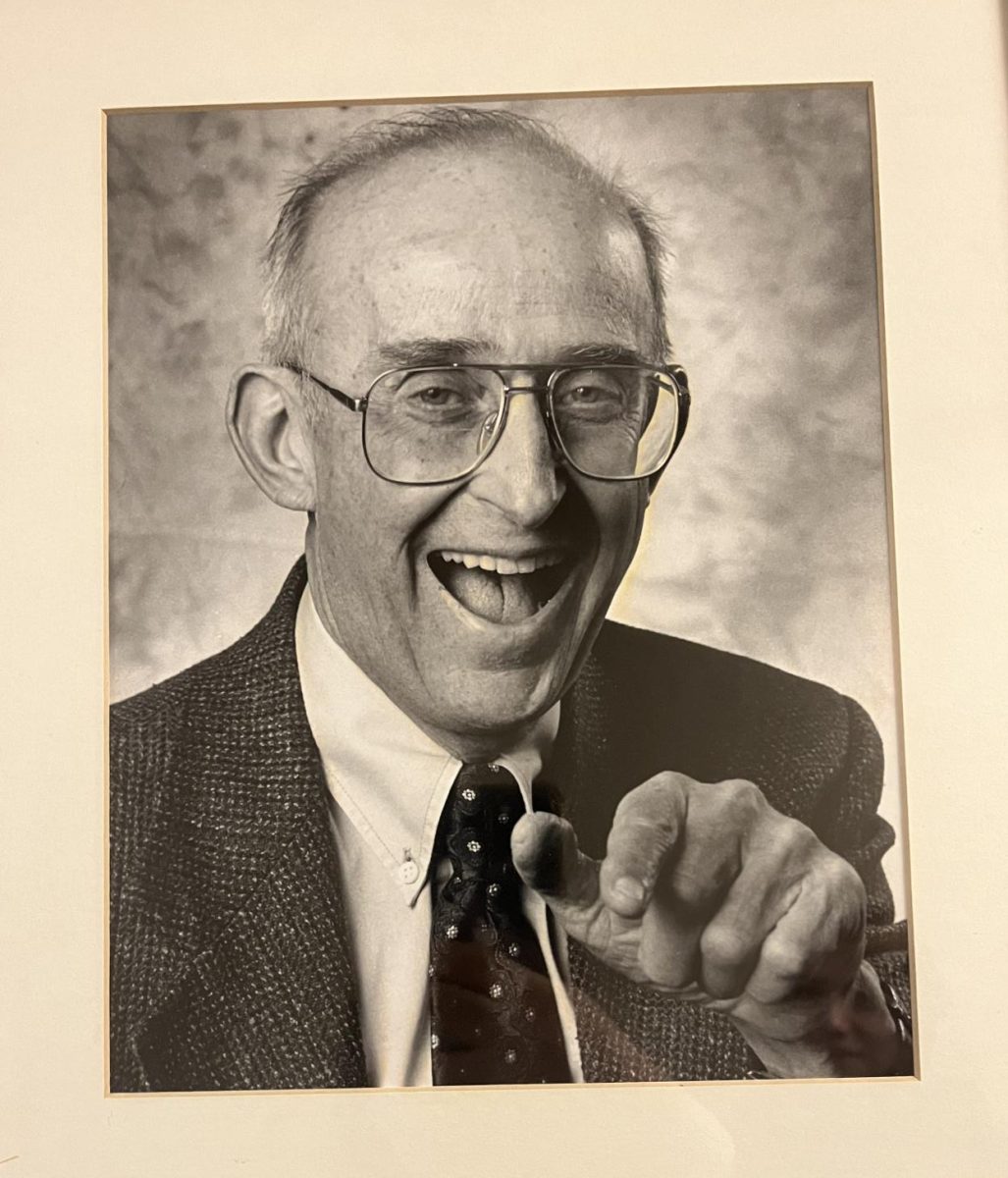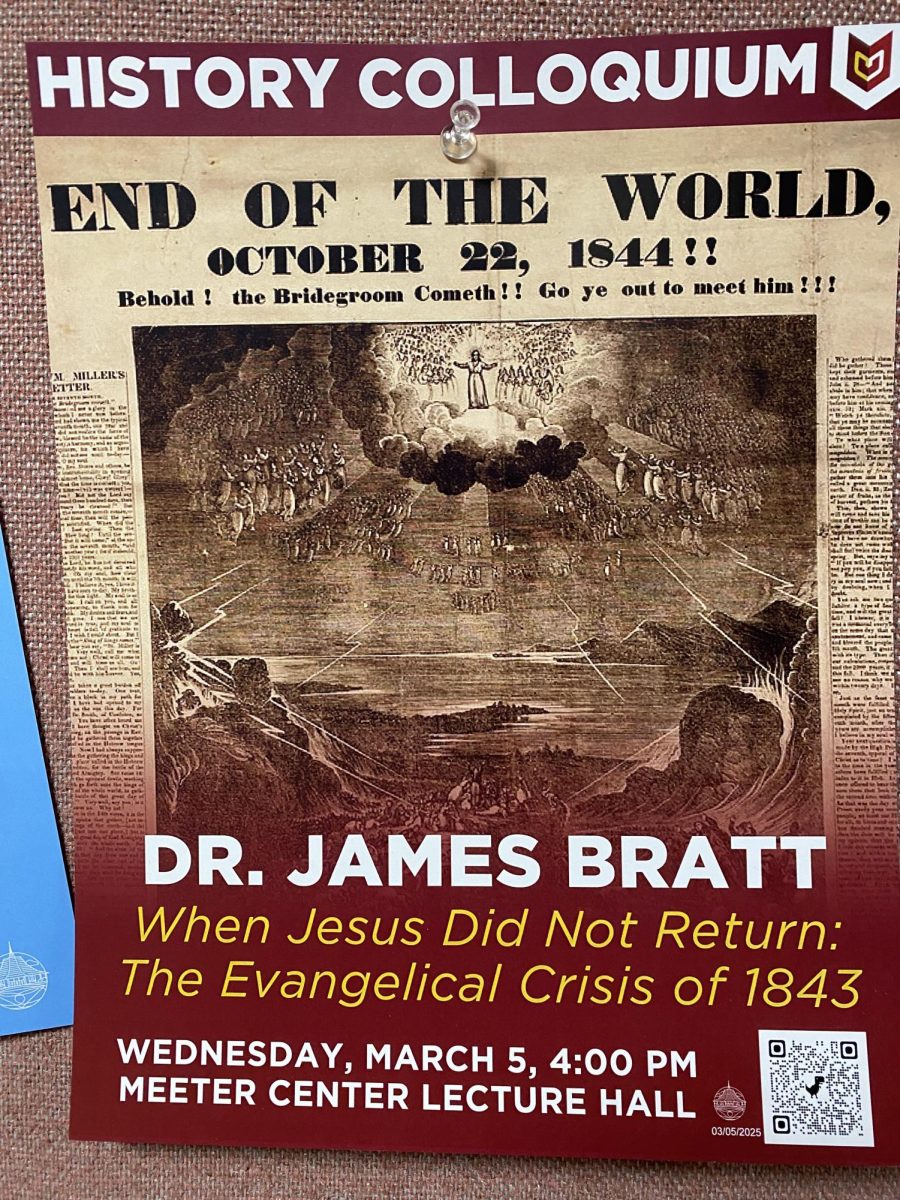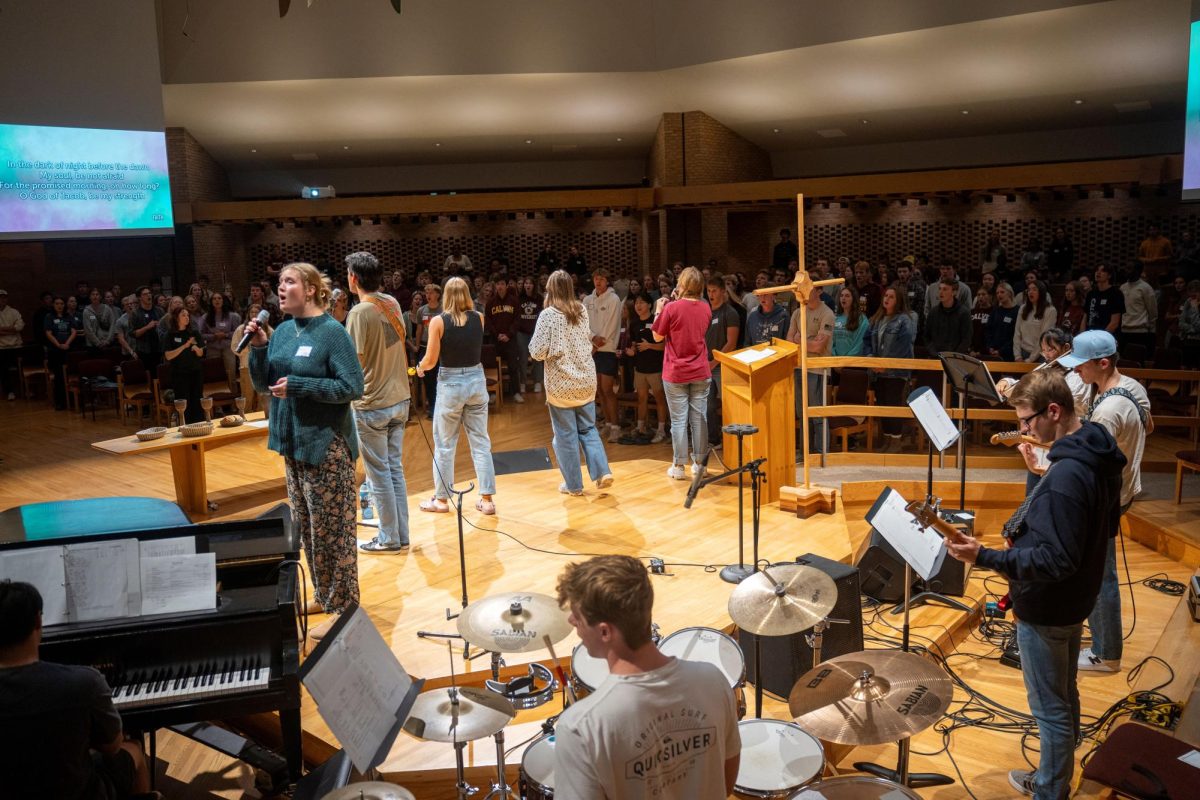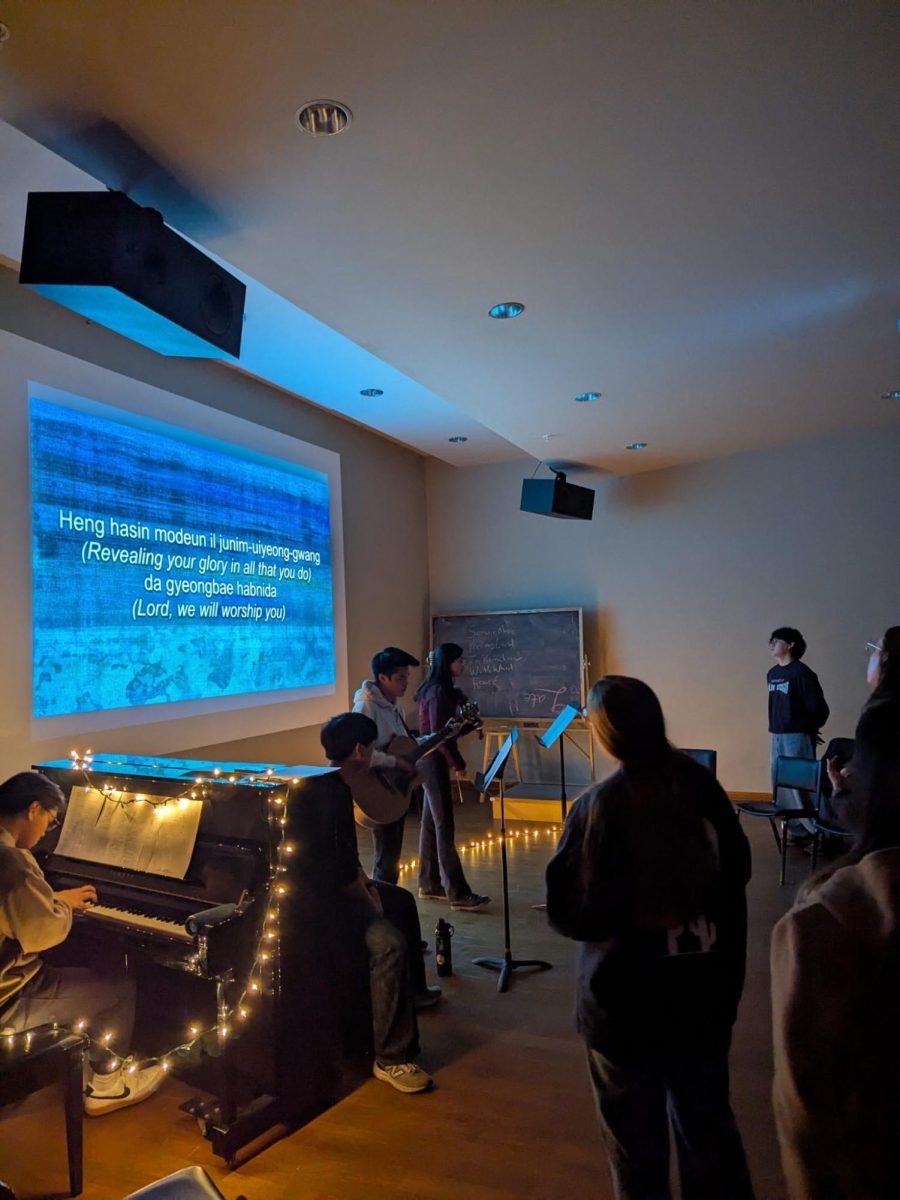Three decades after the Kuiper Seminar’s first session in January of 1994, the seminar continues to work towards its mission of orienting new faculty in Christian teaching and scholarship, rooted in the Reformed perspective.
History
First proposed in 1993, the seminar was originally recommended as a means of guiding new faculty on regular appointment “into the intellectual life, history, educational philosophy and purpose of Calvin,” according to Calvin University’s Heritage Hall archival records.
At the suggestion of donors, the new faculty orientation seminar was named the Kenneth W. Kuiper Seminar –– in honor of Ken Kuiper, a former English professor at Calvin –– according to David Wunder, dean of faculty development and research initiatives and a key leader in the seminar today.
The seminar received a $1.5 million endowment that same year from Roberta and Howard Ahmanson, the former of which graduated from Calvin in 1972, according to the Orange County Register. These funds would be used to provide a course release for new faculty, allowing them to fully commit to participating in the seminar. The first session was held on Jan. 4, 1994, according to Heritage Hall records.
Originally, the program originally ran for 15 three-hour sessions during the January interim. After the final interim in 2021, the seminar was restructured into weekly, 90-minute sessions throughout both the fall and spring semesters, according to Wunder. This increased timespan has allowed the seminar’s content to be expanded to include even more focus on the integration of faith in teaching, said Wunder.
Current program
In its current form, Wunder leads the seminar along with religion professor Won Lee, and both see the mission of the program today as “an invitation” to new faculty to join the enterprise of Calvin. Often, said Wunder, the experience of a new full-time faculty member at Calvin can be overwhelming as they are “assimilated into the project” and sometimes “los[e] themselves in less than positive ways.” The Kuiper seminar serves as a “springboard” for new faculty to begin to think about what Calvin’s mission is; the seminar also shows new faculty how their diverse and fresh experiences will benefit their students and fellow faculty members, Wunder told Chimes.
The content of the seminar has several focus areas, according to Wunder. First, the curriculum grounds faculty in the Reformed tradition. Through reading and discussion, Wunder and Lee give participants an overview of what Wunder called, “the formative thinkers and theologians of the Calvin Project.” This includes the history and writings of John Calvin, Abraham Kuyper, Jonathan Edwards and St. Augustine. After seminar participants consider how Calvin’s Reformed accent shapes its character as a university, the seminar next focuses on the “conceptual work” of understanding Calvin’s mission, 2030 vision statement and relationship to the CRC denomination, according to Lee.
Perhaps most importantly for Lee and Wunder, the seminar spends most of its time focused on the integration of faith and teaching. With the help of Calvin’s own educational experts Jim Jadrich, Crystal Bruxvoort and David Smith, Wunder and Lee walk with the seminar participants through questions of how Christian faith is incorporated in the classroom. These questions cover many aspects of pedagogy, including designing a course, setting up a classroom experience, introducing students to a course on the first day and good test-giving practice, according to Wunder.
Though Lee and Wunder are leaders of the seminar, they have also benefited from the seminar. For Lee, deep discussions about how Christian faith can inform every facet of teaching practice have changed the way he thinks about his role as professor. Even after more than 20 years of teaching, he has still “learned a lot” through leading the Kuiper Seminar. Lee told Chimes that if he had the same kinds of experience the Kuiper Seminar has given him when he first started at Calvin, “I may be a better teacher now.”
Continued faculty development
For Wunder, the goal of the Kuiper Seminar is ultimately to support faculty as they grow in their teaching and scholarship, and as they work through the tenure review process. This goal is supported more fully in the seminar’s new full-year format, which Lee said helps to combat the way in which the previous January Interim seminar felt “jam-packed” and “disconnected” from the rest of a faculty member’s career. After a new faculty member has completed the Kuiper Seminar in their first year, they continue to be supported in their career through the work of the deVries Institute for Global Faculty Development.
According to Matthew Lundberg, director of the de Vries Institute, the institute serves to continue the conversations of the Kuiper Seminar. Begun in a preliminary way in 2019 and instated with full funding in 2020, the institute works to encourage academics at Calvin as well as globally to “think carefully about how Christian faith makes a difference for what they do,” said Lundberg. Through the Faith and Learning Fellowship –– a program completed in a new faculty member’s first few years at Calvin –– the de Vries Institute guides new faculty through considerations they began in the Kuiper Seminar in the hopes that they will inform a faculty member’s career for years to come, Lundberg told Chimes.
In a full-time faculty member’s second year at Calvin, they continue in a cohort experience similar to the Kuiper Seminar, according to Wunder. In this cohort, they discuss how Christian theological and philosophical lenses can inform the way an academic participates in their discipline, Lundberg told Chimes. According to Lundberg, faculty members are also paired with a “companion scholar,” a senior faculty member in the same discipline as the new faculty member, who helps new faculty grow in their understanding of what scholarship could look like as a Christian.
The third year at Calvin offers a chance for new faculty to implement the ideas they have learned in the Kuiper Seminar and in the first year of the Faith and Learning Fellowship into their work. In their fourth year, new faculty return to the de Vries Institute to complete their faculty development training in the Faith and Learning Fellowship.
Participant Experience
For Tyler Greenway and Rachel Hammond –– both first-year, full-time faculty at Calvin who are in the midst of the Kuiper Seminar –– the program has offered them a chance to dive into how Christian thought shapes their teaching, and it has connected them with a diverse cohort of other seminar participants.
Hammond –– an associate professor of management in the School of Business, had previously taught at Cornerstone University –– finds that the Kuiper Seminar is mostly similar but in some ways unique to her previous new faculty orientation program at Cornerstone. The Kuiper Seminar, she said, is much more rooted in the Reformed perspective and has felt much more centered on that Reformed perspective influences pedagogy, whereas her orientation at Cornerstone focused more on covering a variety of different topics.
Hammond is also grateful for the ways in which the Kuiper Seminar has connected her with other new faculty. Not only has this cohort served as an introduction to the Calvin community and provided strong social support, Hammond has also found that the diverse cultural and academic experiences that others in the seminar have shared have shaped the way she thinks about her own scholarship.“Calvin is a very autonomous culture…So to have the opportunity to really build that community and get to know people is a positive for me,” Hammond told Chimes.
An associate professor of psychology, Greenway has had a similar experience to Hammond’s. When it came to instruction on pedagogy, “all those topics have been things I’ve received some instruction on, but Calvin has, I think, really elevated my thinking” regarding the integration of faith and learning.
University Commitment
For Hammond and others, the Kuiper Seminar demonstrates Calvin’s strong commitment to fostering and developing its faculty in Christian scholarship. The fact that the university has funded a course release for each faculty member to fully participate in the program was, for Hammond, a “good signal to new faculty coming in that says, ‘we care about your development.’” Wunder also finds that as the university is committed to hiring the right faculty to serve students well, the Kuiper Seminar’s work in faculty development is “an acknowledgment of what we need to invest in.”







